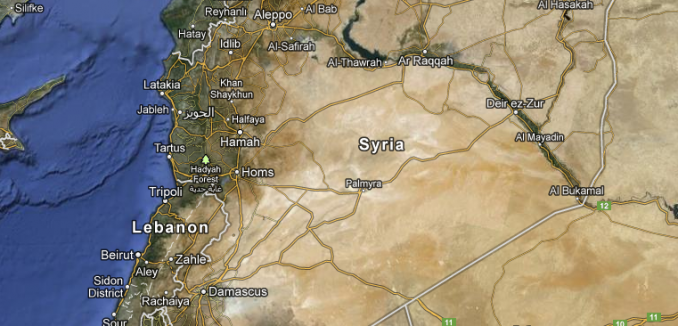It is far from certain the Iran-backed Assad regime in Syria or the Lebanese based Iran-backed terrorist army Hezbollah will clear the fog surrounding the air strike that struck Syria between Thursday night and Friday.
One might expect decision-makers in Damascus or Hezbollah’s south Beirut headquarters to respond to U.S. media reports (echoed in the Arabic press) over the strike on a convoy of advanced missiles capable of carrying both chemical and conventional payloads that Syria was transferring to Hezbollah in Lebanon.
But despite what logic might dictate, neither Syria nor Hezbollah has any interest in doing so. Admitting that an Israeli air strike occurred would place the Syrian or Hezbollah leadership in a familiar dilemma of whether to respond or stay mum.
From the perspective of the “Arab street,” Bashar Al-Assad and Hezbollah chief Hassan Nasrallah are required to respond to this latest “Israeli aggression.” Over the years both have gone to great lengths to brand themselves as the torchbearers of the “Resistance” to Israel, and ignoring the strike would prompt a torrent of criticism in anti-Syrian pan-Arab news outlets like Al Jazeera and Al-Arabiya.
Seen in that light, the Syrian silence over the strike makes sense. Hezbollah’s Al-Manar television broadcast the remarks of Damascus’ UN envoy, who said his country knows of no Israeli strike on its soil. Even the Hezbollah-linked Al-Mayadeen television aired a denial from Syrian army officials that any Israeli operation had taken place.
In the meantime, reports rolled in for the fourth straight day about Israeli overflights in Lebanese airspace, including not only south Lebanon, but over Beirut and even north of it toward the Bekaa Valley, a Hezbollah stronghold.
A Syrian or Hezbollah admission of Israeli responsibility would bring with it compelling pressure to act. Assad – and to a large extent Nasrallah – has no desire to be dragged into a military tangle with Israel at present. The Syrian army of today lacks the manpower to confront Israel on land, and certainly in the air. A clash with Israel would deprive him of the single advantage he still retains over the opposition: his air force.
For Nasrallah, the issue is more complex. Hundreds of his men are now fighting in the Syria-Lebanon border area around Al-Qusayr. More than 130 Hezbollah operatives have been killed there, so for him, taking on Israel now could also be more than Hezbollah could handle. That said, Nasrallah could still strive to create various military provocations against Israel to try to reverse some of the isolation Hezbollah has suffered among Sunni Muslims in Lebanon and the region.
The Iranians, of course, also have a say in Nasrallah’s actions. A number of Arabic media outlets have reported that the Hezbollah leader visited Tehran last month and met with Iran Revolutionary Guard commander Qasem Soleimani, the terror mastermind responsible for implementing the Supreme Leader’s policies in Iraq and Syria. The two leaders reportedly discussed Iranian plans to expand Iran’s influence in Syria should the Assad regime ultimately fall. Iran and Hezbollah already acting to militarily seize control of Syria, as TheTower.org reported last week, and Western intelligence officials have publicly said Hezbollah and Iran have over 50,000 IRGC and other agents in Syria, and are working to insert 150,00-man force in the country.
Solemani and Hezbollah’s interest in terror attacks extend across oceans, as numerous recent Iran-linked terror attacks and plots in Europe, Asia and North America have shown. The Wall Street Journal’s Jay Solomon reports in recent a profile of Solemani, “the U.S. Treasury Department sanctioned Gen. Soleimani for his alleged role in a bomb plot aimed at killing the Saudi Arabian ambassador at a cafe in Washington, D.C.,” and blowing-up Israel’s embassy in the United States.
But Iran will not likely deploy Hezbollah against Israel at the moment, but will preserve the group’s military capacities – particularly its rockets – for a possible future attack by Israel or America on its own nuclear facilities.
In recent years Hezbollah has returned to its modus operandi of the 1980s and 90s: focusing on Israeli targets and Jewish ones abroad. Since the 2008 assassination of Hezbollah strongman Imad Mughniyeh, the group has significantly bolstered its terror infrastructure with the generous assistance of the Revolutionary Guard. The goal is to move the battlefield away from Lebanon, and (as with last year’s Bulgaria bus bombing) carry out attacks while attempting to create plausible deniability of Hezbollah’s responsibility.
As that happens, increasing questions remain as to the European Union’s willingness to permit Hezbollah, which has killed more Americans than any terrorist group except al Qaeda, to raise millions of dollars all across Europe that it uses to fund terrorism, and lately to help Assad slaughter his own people in Syria. For the French government, this conundrum is particularly intense. As the primary sponsors in Europe of the Syrian opposition, it is diplomatically and morally obtuse for the French government to simultaneously lead the effort in the European Union to block the total blacklisting of Hezbollah, thereby allowing the Iranian-backed A-team of Terror continued unfettered use Europe as a major financial and operational hub of their murderous and destabilizing activity.
(For more on Hezbollah’s unchecked presence all across Europe, and what’s behind it, read TheTower.org/MAGAZINE’s May 2013 issue: Europe Has a Serious Hezbollah Problem )




